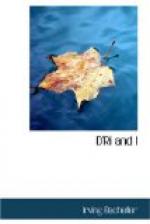A troop of cavalry was approaching at a gallop. They pulled up a few rods away and jammed into a big crescent of rearing, trampling horses. We could see they were American soldiers. We all lowered our guns.
“Who are you?” one of them shouted.
“Citizens,” my father answered.
“Why are you armed?”
“To fight Injuns.”
A chorus of laughter came from the cavalry.
They loosed rein, letting their horses advance.
“My dear man,” said one of them, a big shako on his head, “there ain’t an Indian ‘tween here an’ St. Regis. We thought you were British, an’ it’s lucky we did n’t charge in the dark; we ’d have cut you all to pieces before we knew who you were,”
A body of infantry was marching down the pike. They were the volunteers of Captain Darius Hawkins, on their way to Ogdensburg, with an escort of cavalry from Sackett’s Harbor. The scare was over. Women came out, laughing and chattering. In a few moments they were all in the road, going home—men, women, and children.
I enlisted with Captain Hawkins, and hurried to the house, and packed my things, and bade them all good-by.
V
I followed the camp and took my place in the ranks at Ogdensburg. We went immediately into barracks—a structure long and low and weather-stained, overlooking the St. Lawrence. There was a fine level field in front of it, and a flag waving at the top of a high staff. The men cheered lustily that afternoon as they passed it, where stood General Jacob Brown, his cocked hat in his hand—a splendid figure of a man, My delight in the life of a soldier began that hour, and has never left me.
There was a lot of horse-play that night, in which some of the green boys were roughly handled. They told me, I remember, that all new recruits had to fight a duel; but when they gave me the choice of weapons I was well content. I had the sure eye of my father, and the last time I had fenced with him, there at home, he said my arm was stronger and quicker than his had ever been. Indeed, I was no sooner tall enough to swing a sword than he began teaching me how to use it. In the wood back of the barracks that night, they learned I was not a man to be fooled with. The tall sergeant who stood before me saw his sword go flying in the gloom the second thrust he made at me, and ran for his life, amid roars of laughter. I had no lack of friends after that day.
It was a year of surprises in the Northern army, and D’ri was the greatest of all. That long, wiry, sober-faced Yankee conquered the smartness of the new camp in one decisive and immortal victory. At first they were disposed to poke fun at him.
“Looks a little tired,” said the sergeant of the guard.
“Needs rest—that’s what’s matter o’ him,” said the captain.
“Orter be turned out t’ grass a leetle while,” the adjutant suggested.




